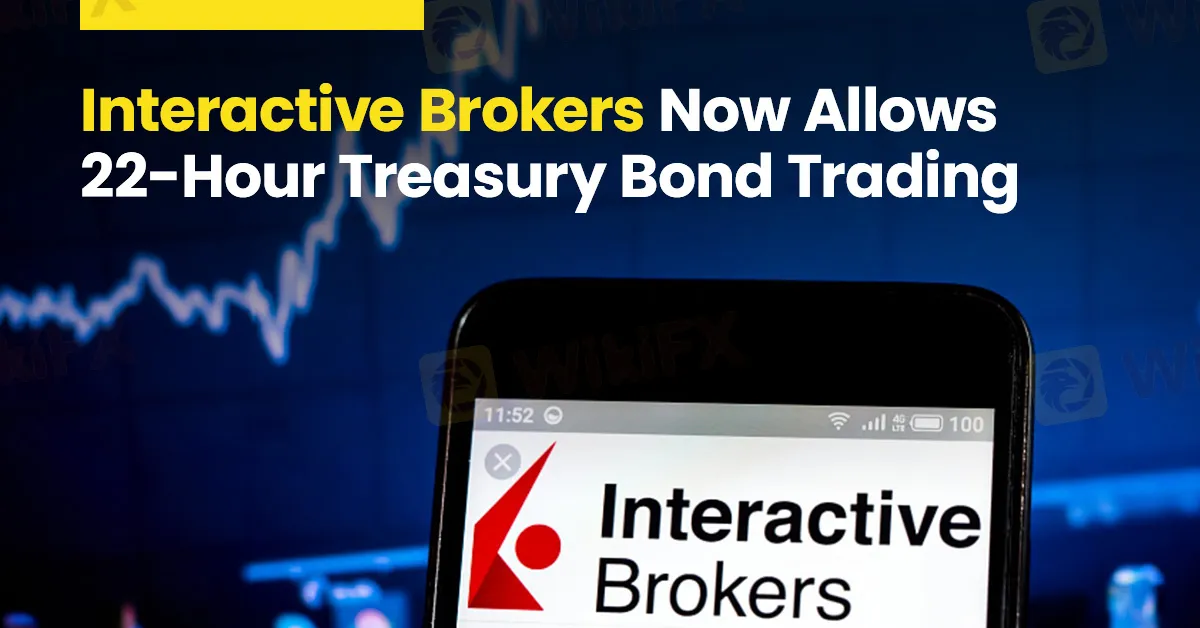简体中文
繁體中文
English
Pусский
日本語
ภาษาไทย
Tiếng Việt
Bahasa Indonesia
Español
हिन्दी
Filippiiniläinen
Français
Deutsch
Português
Türkçe
한국어
العربية
Interactive Brokers Now Allows 22-Hour Treasury Bond Trading
Abstract:Interactive Brokers has expanded trading hours for US Treasury bonds, now allowing trading for 22 hours daily.

Interactive Brokers has expanded trading hours for US Treasury bonds, now allowing trading for 22 hours daily. Previously, clients were confined to nine hours per day, but they can now engage in transactions from 5:00 pm Eastern Time (ET) to 5:00 pm the following day, with a brief hiatus from 5:00 pm to 8:00 pm Eastern Daylight Time (EDT).
In a statement released today (Thursday), the company articulated that this move empowers its global clientele to synchronize trading activities with their respective local time zones and promptly respond to global market developments.

The significance of this initiative was underscored by Thomas Frank, the Executive Vice President of Interactive Brokers, who emphasized that extending trading hours for US Treasury bonds is part of the company's ongoing commitment to broaden its bond offerings by incorporating new coverage, products, venues, and liquidity. He further stated that their goal is to provide clients with the most adaptable and comprehensive trading environment available, stressing the importance of catering to their requirements and offering opportunities to trade on a schedule that aligns with their preferences.
Interactive Brokers boasts an array of bonds, encompassing corporate, municipal, treasury, and non-US sovereign bonds. Moreover, the firm equips clients with complimentary access to the IBKR Bond Marketplace search tool, enabling them to tailor investments according to their unique preferences and objectives.
In a recent development, Interactive Brokers broadened its footprint in Japan by introducing Contracts for Difference (CFD) instruments, facilitating leveraged trading opportunities on shares from the US, Europe, and other global markets.
Presently, the brokerage giant provides a diverse array of trading options, spanning global stocks, options, and futures. The incorporation of CFDs in Japan empowers traders to access financial instruments for both long and short positions.
Interactive Brokers delineated the commission structure for CFD trading, indicating that for US share CFDs, commissions commence at a minimum of $0.0055 per share. These rates fluctuate across different markets, with Japanese share CFDs initiating at 0.033 percent of their trade value, while Singapore share CFDs commence at 0.121 percent.
Despite prevailing market headwinds, Interactive Brokers recently disclosed encouraging financial performance. Revenue surged by 13 percent to $1.2 billion in the first quarter of the year. Notably, commission revenue experienced a robust upswing, reaching $379 million, propelled by a 25 percent surge in customer accounts, now totalling 2.75 million.

Disclaimer:
The views in this article only represent the author's personal views, and do not constitute investment advice on this platform. This platform does not guarantee the accuracy, completeness and timeliness of the information in the article, and will not be liable for any loss caused by the use of or reliance on the information in the article.
Read more

ActivTrades returns to profitability
London-based broker ActivTrades has released its financial results for 2024, signaling a robust turnaround following a challenging 2023. The broker recorded notable improvements in profitability, client acquisition, and capital reserves, marking a year of renewed momentum and strategic recalibration.

Is forex trading profitable?
Many traders think that forex trading can make quick profits, but the truth is more complex. While some people do make money in the forex market, others fall prey to its many pitfalls because, in this industry, the scams and misleading promises are widespread.

Admiral Markets: A Mix of Regulation and Risk
Despite multiple licenses, Admiral Markets presents potential red flags that traders should not ignore, including a suspicious clone alert and disclosure by Malaysia’s Securities Commission.

Eightcap UK Launches Free TradingView Plus Subscription for Traders
Eightcap UK offers free TradingView Plus subscription with new trading accounts, unlocking advanced features and seamless integration for UK traders.
WikiFX Broker
Latest News
Tokenized Stocks: Innovation or Just Another Wrapper?
Gold Rush Again: What's Driving the Bullion Market Crazy Ahead of US Jobs Data?
XTB Launches Tax-Advantaged Retirement Accounts in Poland
Zaffex Broker Review
ECB Ends Easing Cycle, But The Eurozone Crisis Is Just Beginning
Amazon deploys its 1 millionth robot in a sign of more job automation
MT4 and MT5 Platforms - Helping Traders Up Their Forex Trading Game
A bare-bones deal is Europe's best hope in trade talks with the U.S., sources say
10-year Treasury yield remains higher despite weak ADP jobs report
Blueberry Markets Revamps its Website
Currency Calculator


